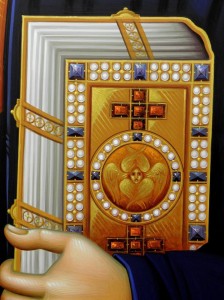by Fr. Thomas Hopko
 Several people have contacted me through email and even in person when I travel around and visit people who listen to Ancient Faith Radio. They ask me about reading the Bible. There’s all kinds of questions that are given to me that I get from people about reading the Bible. Some folks said,
Several people have contacted me through email and even in person when I travel around and visit people who listen to Ancient Faith Radio. They ask me about reading the Bible. There’s all kinds of questions that are given to me that I get from people about reading the Bible. Some folks said,
“You know, Fr. Tom, you ought to maybe speak on the radio very simply, very directly, offering whatever advice and counsel you would give to people, especially people who are not theologically trained but who are very much participating in Church life and very interested in the Holy Scripture and in the Bible and trying to understand it, if you would give some suggestions, very concrete suggestions, simple, concrete suggestions about Bible reading in the Orthodox tradition, in the Orthodox Church.”
How was the Bible read in the ancient Church? How is it read by the Church Fathers? How is it used in the Liturgy? How should we read it, today, now, in the 21st century? These are the questions that are asked, and so I’m going to just say a few things about that right now.
I would just like to comment, though, that it’s interesting for me, being an old guy, that the very first publication that I ever made in my entire life, way back in 1964, I believe it was… It’s a long time ago. I was a young priest, a very young priest, in my 20s, in Warren, Ohio, in my first parish. We had a deanery there of priests, and we used to publish little booklets. I was assigned to publish a booklet, to produce a booklet called “Reading the Bible.” In that booklet, my task was to convince Orthodox people that we ought to read the Bible, especially if we’re literate; if we’re not literate, we should like to know the Bible, hear the Bible, listen to it, listen to it read, listen to it in church; that the Bible is our book. It’s the book of our covenanted community with God, the holy Church, beginning with the people of Israel. The Bible are holy Scriptures, God-inspired, God-breathéd Scriptures, writings that are given to us for our salvation and for our instruction.
Many Orthodox people at that time were discouraged in reading the Bible, even discouraged to read the Bible. I remember in my childhood, my own priest would say:
You know, don’t read the Bible. The Church knows what the Bible says. Just come to church, say your prayers, keep the commandments of God, and let the experts deal with the holy Scripture. If you start reading the Bible yourself, you’re going to get all mixed up. You’re going to get confused. You’re going to end up what they called in those days in the Slavic tongue, a bibliosh; you’re going to become a bibliosh. You’re going to just follow the Bible. You’re going to become a sectarian. You’re going to end up in one of the 2,000 Protestant churches and perhaps go from church to church, trying to find the real Bible Church and the place where they really understand the Bible. So just don’t get into it at all.
But when I went to the seminary and began to study, I realized I was [mis]taught. This was absolutely not the truth. Just plain not the truth. The New Testament Scriptures themselves speak about reading the Old Testament Scriptures. They speak about searching the Scripture. They speak about all Scriptures being inspired by God, and so on. Then when I started studying the Church Fathers—wow! Every single one of them said that if you are literate, you should try to get contact with the Holy Scriptures and read it, devour it. They even have that expression: to chew it. In the Latin tradition they call it the ruminatio verbum Dei, the chewing of the word of God.
Then I heard such texts like John Chrysostom, who said,
“The cause of every difficulty and schism and division in the Church is the ignorance of the holy Scripture.”
Or I remember a very vivid sentence of St. Gregory the Theologian who said about his brother bishops,
“They quote the Scripture second-hand, and even then they get it wrong,” he said.
